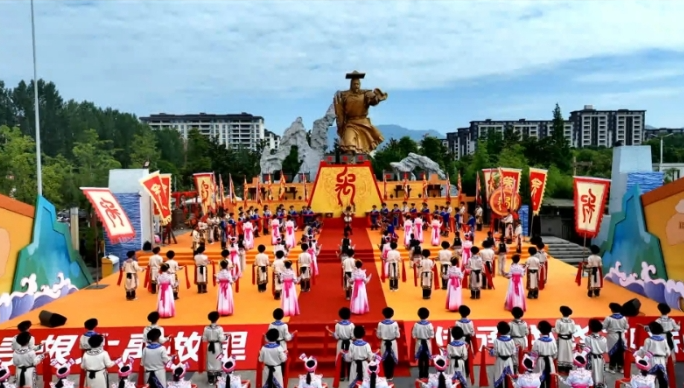Before their visit to Beichuan County in Southwest China’s Sichuan Province, members of a young exchange group from Taiwan were familiar with the story of Great Yu, the legendary flood controller dated to around 2,300-2,200 BC. However, standing at the hero’s birthplace provided them a tangible connection to the significance of Yu in Chinese civilization.
The sixth cross-Straits exchange event on Yu culture took place in Beichuan County on Wednesday and Thursday, drawing over 200 attendees. The participants gathered for a grand ceremony to honor Great Yu on the recorded date of his birthday and to delve into the enduring spirit of Yu.
According to legend, the flood story starts during Emperor Yao’s reign when both the Yellow River and Yangtze River valleys flooded. Emperor Yao initially tasked a relative named Gun with flood control efforts, which ultimately failed. However, Gun’s son Yu succeeded by focusing on drainage rather than containment with dams and dikes, earning Yu immense respect and fame across the nation.
During Thursday’s ceremony, Yu’s spirit was celebrated for his selflessness and wisdom, exemplified by his dedication to flood control and aiding victims. A graduate student surnamed Hsiao from Taiwan expressed to the Global Times that while he had known of Yu’s contributions, participating in the event deepened his appreciation of the courage and wisdom of Chinese ancestors in facing disasters.
Yu culture embodies the resilient and determined Chinese spirit. Wang Jianmin, a senior cross-Straits expert at Minnan Normal University in Fujian, emphasized the significance of sharing this heritage with Taiwanese youth, especially amidst current political tensions across the Straits.
In addition to the worship ceremony, the Taiwanese visitors explored local museums dedicated to the Qiang ethnic group culture, a significant community in Beichuan. They experienced Qiang embroidery and engaged with local students. For many, it was their first visit to the county and an introduction to the life and traditions of the ethnic group.
A Taiwanese art and design student found inspiration in Qiang embroidery, telling the Global Times that the visit sparked new creative ideas.
Recent years have seen an increase in cross-Straits exchanges focused on traditional Chinese culture. The current event in Beichuan County stands out by showcasing “diverse and localized Chinese traditions,” according to Wang. While cities like Beijing and Shanghai offer glimpses of Chinese modernity, the Great Yu culture in Beichuan provides a different perspective.
“Young people from Taiwan can be a bridge to change how society as a whole understands Chinese traditions like Yu culture,” Wang noted.
Having been held five times, the Yu culture event has become a local cultural symbol. In a press conference on June 26, Zhu Fenglian, spokesperson for the Taiwan Affairs Office of the State Council, invited Taiwan residents, particularly youth, to visit Great Yu’s hometown during summer vacation to learn more about his story.

